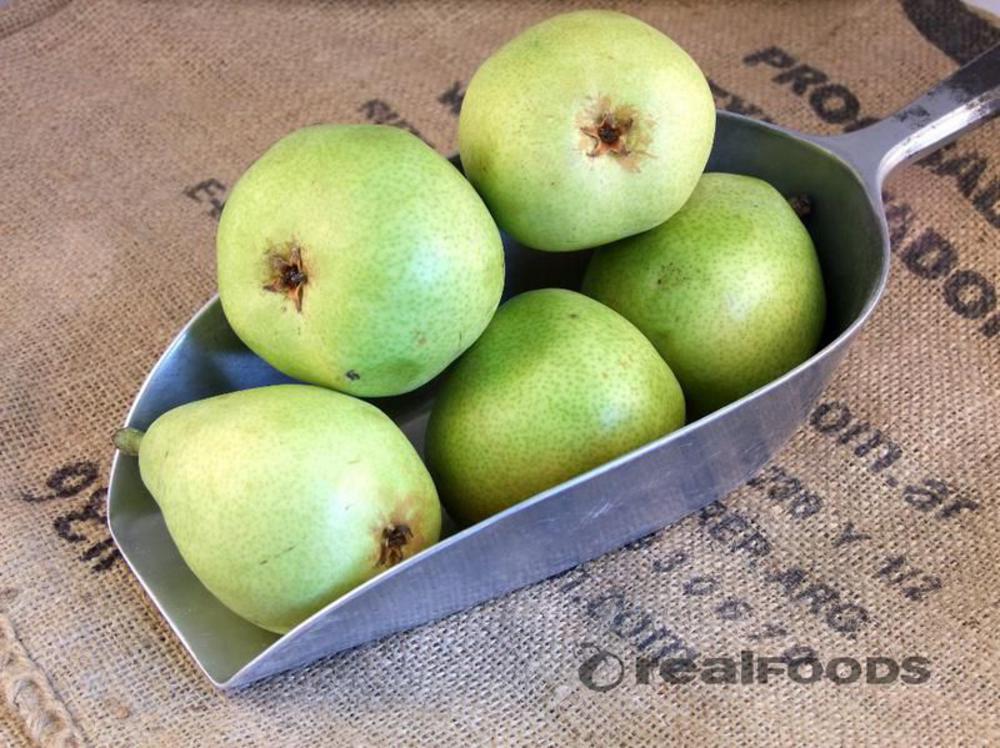
Where are pears from?
Pears are from Asia Minor originally. Like their relatives Apples and Quince, Pears probably derived from a parent species which is now extinct. They are members of the Pyrus genus which has around 22 species and is native to Asia, northern Africa and Europe. The Asian Pear (Pyrus pyrifolia) has been grown in China for at least 3000 years and was probably one of the first domesticated wild fruits. The European Pear (Pyrus communis) has been cultivated since at least 1000 B.C. They are mentioned in Homer's Odyssey around 800 B.C. The Ussurian Pear (Pyrus ussuriensis) is a native of China and is grown more for ornamentation than for its fruit. Here at Real Foods we sell Organic European Pears sourced mainly from France and the U.K., although sometimes we get in special varieties from Argentina. If you'd like to know the country of origin for a specific pear, please email us at webshop@realfoods.co.uk and we'll let you know where we've bought them in from.
What do pears look like?
Generally speaking European Pears are well... pear-shaped! The Asian Pear is a little more rounded and similar to an apple in shape. European Pears have paper-thin skins and come in brown, yellow, red and green skinned varieties. They bruise easily so be gentle. The skin and just under it is where the vitamin C is so don't peel them to get the maximum nutrition.
And on the inside of a pear?
Pears have sweet, aromatic flesh, depending on the variety they can be either crisp or soft. They are widely used in French desserts (France has a long history of cultivating them) for their sweet flavour.
What do pears do?
Pears are brilliant for anyone with allergies as they are a very low-allergen food - they are low in salicylates and benzoates. They are often recommended for people convalescing after illness, as a first fruit or juice for infants or for people following exclusion diets. Pears are brilliant for digestion containing high amounts of insoluble fibre that can help maintain healthy bowels. They are useful for people with rheumatic conditions (such as gout of arthritis) as their combination of potassium, tannins and pectin help dissolve uric acid. Pears contain useful amounts of beta-carotene, B vitamins and Vitamin C, since Vitamin C triggers the production of norepinephrine and serotonin (neurotransmitters) they can make you happy!
So now you know all about pears... what to do with them? Eating them fresh and raw is always a good option to get the maximum nutrition, follow this link to buy fresh pears online.
They are also available dried, very useful for a quick snack on-the-go or for using in cooking. Making a fresh juice from them (simply pulp and add a little water) will create a cooling uplifting drink, that's especially popular with kids and folk with upset stomachs. Or there are ready-made pear juices available here. There are also air dried pear crisps available! Try poaching fresh pears for a delicious dessert, simply cook them gently, add a little grated ginger or cinnamon and serve warm. Or try this delicious Vanilla Poached Pear recipe.
You can find all of our Pear recipes here. Including a delicious Roquefort and Pear Salad and Spiced Toffee and Pear Torte